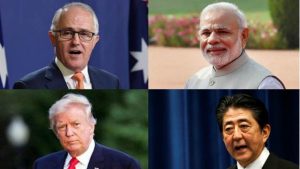Home » Commentary » Opinion » The Four Sides of the Quad
· IDEAS@THECENTRE
 With the Chinese dragon gaining a stronger foothold in the Asia-Pacific region, we’ve seen a revival of the ‘Quad’ — the Quadrilateral Security Dialogue of Australia, Japan, India and United States.
With the Chinese dragon gaining a stronger foothold in the Asia-Pacific region, we’ve seen a revival of the ‘Quad’ — the Quadrilateral Security Dialogue of Australia, Japan, India and United States.
The Quad’s aim (to secure their interests in this region of geopolitical significance) means China’s assertiveness will now be cautioned by four democracies that hold immense value — political and economic — to Beijing.
The inverse holds true too. The Quad can be viewed from four sides that highlight the differing agendas in this security club.
For India, Xi’s Belt and Road Initiative brings its two historical rivals — China and Pakistan — together, and includes massive infrastructural projects in the Indian Ocean. Indian PM Narendra Modi is not naïve. He realises China may soon be able to contain India from all sides and undermine its national security and regional interests.
Past alleged injustices at the hands of the Japanese make Japan (possibly) the country China would least want to ally with. India and Japan’s territorial skirmishes with China also mean engaging in a security dialogue against their mutual adversary is a very strategic bulwark.
For the US, China’s increasing influence in the Asia-Pacific is a challenge to its interests and hegemony in the region. The Quad allows Washington to collaborate with three major powers of this region and serves as a unified front to help contain China — in a sense, the US’s ‘Asian NATO’.
Australia predicts possible ‘frictions’ with a rising China and emphasises the practice of a rules-based system in the South China Sea. But while Australia’s foreign policy defense paper reaffirms its commitment to the Quad, we remain the least strident player in the club — largely due to trade considerations.
The Quad’s four sides are essentially India’s ‘Act East’ policy, US’s rebalancing strategy, Japan’s ‘Proactive Contribution to Peace’ — and Australia’s careful approach to a rising superpower that is also our largest trading partner.
Aarti Sharad Seksaria is a masters student in international relations at ANU, and an intern at the Centre for Independent Studies
The Four Sides of the Quad